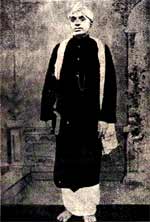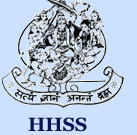|
|
 |

|
Rao Bahadur M. Rangacharya,
M.A.,
1861-1916
|

|
 |
Secretary to the Committee of Management of the Hindu High School,
Triplicane (1906-1912)
The Hindu High School had the unique and proud privilege of
having on its Committee great educationists, besides eminent
lawyers, adminidtrators and businessmen. The late Mr.M.Rangachariar,
that versatile scholar and educationists who won the admiration
of even western scholars, served the Hindu High School Committee
both as an ordinary member and as Secretary, for a period of
about six years.
Prof. M.Rangachrya was born in March 1861 at Melkote of a very
orthodox Sri Vaishavite family both on the mother's and on the
father's side. |
Even
in the days of his early education at the Wesleyan Mission High
School, Mysore, his precocious powers of study and thirst for
knowledge were clearly noticeable and these earned him double
promotions in his high school forms. He passed his matriculation
examination in the first class. Thon he joined the Madras Christian
College and came under the influence of the magnetic personality
of Dr.Miller. The mutual regard of master and pupil is clearly
seen in Prof. Rangacharya's dedicating the first volume of his
lectures on the 'Gita' to his master. Those who know Prof. Rangacharya
only as the pioneer Professor of Sanskrit Literature might not
be aware of his having been a student of Physical Science in
his college days and his having passed two out of the three
examinations necessary in those days for qualifying himself
for the M.B.&C.M. Degree. Because of the persuasion of Dr.
Kees, the then Principal of the Medical College, he gave up
his medical studies and joined the Department of Education as
a Science Lecturer at the Government College, Kumbakonam. Subsequently
after taking his M.A. Degree in Chemistry, he became the Profeesor
of Chemistry at the Presidency College, Madras. It was only
in 1901 that he was appointed to the post of the Professor of
Sanskrit and Comparative Philology at the Presidency College.
We commonly know him only as the Professor of Sanskrit. If his
studies had been varied, his professional activities were multi-sided—in
the fielde of electrical mechanics, research in all the aspects
of the age-old culture of his as revealed in his article 'The
Yugas' and his lecture on the Funtion of Religion in Social
Evolution, his translation of Sri Bashyam, his editorship of
the Vedanta journal 'Brahmavadin,' his 87 Sunday lectures on
the Gita, his edition of the Ganithasara Sangraha (a treatise
of Mathematics by Mahavira) with notes and English translation
we find only some of the channels in which his brilliant intellect
engaged itself.
Even now, his lectures on Sanskrit stidies are remembered by
his numerous students as the most valuable studies on comparative
criticism. His unassuming manners and his shyness to face even
his classes formed bewitching personal traits in his character.
He joined the Hindu High School Committee in 1906, and soon
after became its Secretary. The extensions of the school biulding
between 1906 to1909 were of his planning and carried out under
his supervision. He was also instrumental in dedicating the
school hall to the memory of Rao Bahadur M.A. Singarachariar,
who acted in loco parentis to the school for a long time. His
management of the school was marked by sterady progress, and
the Rt,Hon;ble V.S.Srinivasa Sastry, who was the Headmaster
whjen he became the Secretary, in a public meeting at Ranade
Hall recently stated that Prof, Rangacharya was always ready
to undderstand and sympathise with the teachers' point of view.
In 1912, his failing health obliged him to relinquish his office
as Secretary to the School Committee, and he was succeeded by
the late Diwan Bahadur M.O.Parthasarathy Iyengar.
Unveiling his portrait at the Ranade Hall, the Rt. Hon'ble V.S.Srinivasa
Sastry spoke of him as a big man cast in a big mould, and revealed
that Gokhale looked upon him as a possible successor to him
in the position of the President of Servants of India Society.
Writing of him, Professor K.Sundararama Iyer, his friend and
colleagous, observes: "In conclusion, I wish to say this
only of him, that, like all who have had the making of greatness
in them, his personality—I mean, his talents, his energies
and aptitudes and dispositions of all sides taken together—was
far greater than all that he was enabled to accomplish amidst
the possibilities and conditions of his age and environment.
A nature, singularly sweet and gentle, a mind endowed with every
faculty for gaining distinction in the world, a versatile genius
diligently cultivated sa as to make valuable contributions to
the national life in every departement of thought and activity,
a life lived in accordance with the highest ideals of truth,
purity and loving kindness—these form a combination of
excellence, almost or wholly unmatched in this age of social
transition and many-sided conflict in South India."
|
| End of the Content. Press Alt+K
to navigate |
|
|
